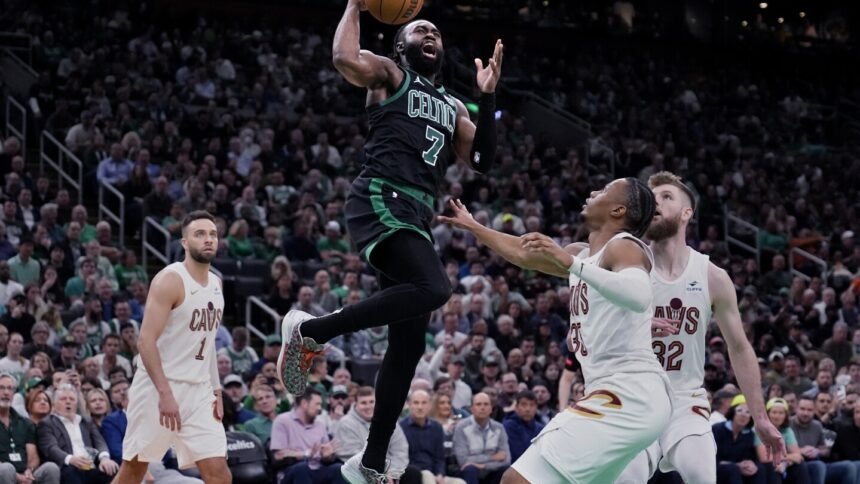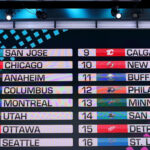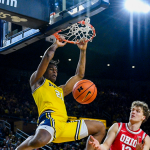The conference finals and Bronny James’ decision to remain in the draft are far from the only things dominating NBA conversations lately.
In fact, both have been trumped by the drama surrounding where fans will be able to watch games for at least the next decade.
The NBA media rights negotiations for deals beginning with the 2025-26 season are well into the fourth quarter, but trying to assess how the final packages will look is difficult. Commissioner Adam Silver will deliver his State of the League speech before Game 1 of the NBA Finals in Boston on June 6.
The only certainties at the moment is that ESPN will retain the top package and Turner Sports’ 40-year relationship with the league is in jeopardy.
NBC and Amazon are the favorites to supplant Turner, but Turner still has the right to match offers from competitors.
What exactly is in those matching rights, along with the public angst expressed by Charles Barkley about Turner possibly losing the NBA, has given negotiations a “Game of Thrones” feel (ironically, another WBD property).
“I don’t know if this is anymore complicated than any other rights deal. It certainly seems to be very public, so I think that’s probably what surprises some people,” said Bob Thompson, the retired president of Fox Sports Networks who runs his own consulting group. “The details seem to be out there. Very seldom do you ever get to the point where people are talking about back-end rights, which exists in most contracts. People just don’t talk about it.”
And very rarely does John Tesh announcing he is going into the recording studio generate a social media frenzy. Yet, that happened last week when Tesh said on a podcast that he would be recording an updated version of “Roundball Rock” next month.
Many saw that as a sign that the NBA and NBC would imminently be announcing a reunion, only for that not to be the case.
While the popular theme song from NBC’s 1990 to 2002 run with the NBA — still considered by many to be one of basketball’s unofficial anthems — will make a return, fans will be able to hear it during the network’s coverage of the Paris Olympics.
The league’s current nine-year agreement, which runs through the 2024-25 season, was finalized in 2014. It brings in an average of $2.67 billion per season, making it the world’s second-richest deal for domestic rights.
The new media rights deal, also expected to be long term, will average at least $6 billion per year.
“The NBA has an idea of what it wants its content partners to be. But the backend rights make that hard for them to do,” said Patrick Crakes, a media consultant and former Fox Sports executive.
Silver said during a Board of Governors meeting in April that increasing valuations was a big part of the strategy, as well as how it would be presented.
“Growing the sport will involve more than getting a high rights fee. It’ll have a lot to do with how the game of basketball is presented to our fans globally,” he said. “As we’re talking to our current partners and seeing what’s available in the marketplace, is what some of these media companies will be able to do with NBA and WNBA content. How will they present it? How easy will it be for fans to find it? What other forms will they deliver it in? What will be the quality of the presentation? All those things become relevant.”
ESPN/ABC and Turner air a combined 165 regular-season games this season. NBA TV, which is owned by WBD, carried 106 regular-season matchups.
The amount of regular-season inventory, as well as the popularity of the first year of the In-Season Tournament, would be beneficial for Amazon Prime Video and/or Peacock.
Regular-season games on ESPN/ABC and TNT averaged at least 1.6 million viewers for the third straight season. The In-Season Tournament final between the Los Angeles Lakers and Indiana Pacers on Dec. 9 averaged 4.58 million on ABC, the second-most watched game of the regular season. Leading the way was the Christmas Day matchup between the Boston Celtics and Lakers at 5.01 million.
Amazon had success growing its market for its NFL “Thursday Night Football” package last season, as more fans made it a part of their viewing habits. Amazon also added NASCAR and will stream five races beginning next year.
“Sports has always been one of the tried and true ways to attract people to your platform. You see the number of people who have stuck (around) on Peacock after the (NFL) playoff game,” Thompson said.
Amazon will also factor into local team rights, should Diamond Sports Group emerge from bankruptcy, after it bought a minority stake in the regional sports networks. Diamond has the rights to 15 NBA teams under the Bally Sports Network.
The doubling of national rights fees should also take some of the pain away with the days of local networks paying exorbitant local fees likely at an end after the bursting of the regional sports network bubble.
The addition of NBC would mark the first time in league history that it would be on two broadcast networks. Once the NFL season ended, it would also allow NBC to continue airing sports on Sunday night.
The NBA could also steal a page from the NFL and retain some of its inventory — such as Christmas Day games — and sell to another streaming partner down the road. The addition of a streaming network, as well as increased fees for cable and linear networks, ultimately mean costs will be passed on to fans through increases in cable bills and streaming subscriptions.
The “League Pass” package of out-of-market games could also go from Turner to a streaming company for the right value. That was part of ESPN’s agreement with the National Hockey League in 2021, when it got the out-of-market games for its ESPN+ streaming service.
Fox, Walt Disney Company and WBD are also in a joint venture to launch Venu Sports.
Nothing is set, though, until the NBA comes to Turner with a proposed package to either match or potentially carve out one of its own.
“These rights are very, very powerful in the context of back-end rights. And the NBA is moving very carefully because I think they recognize that,” Crakes said. “So it’s gone very slow. They don’t need to be necessarily in a hurry at the moment.”
Players and owners, however, would like to have some sense of the league’s future economic outlook before June 30. That is when teams can begin negotiating with potential free agents, as well as up to a 10% salary cap increase for the 2024-25 season.
When the final shot goes in, Crakes predicts the NBA will end up going down a path it didn’t want or quite envision when negotiations started. That would include Turner landing some version of a package so that it can continue charging its current subscriber fees to cable and satellite companies.
“It always comes back to this slow, methodical means that the NBA is going to try to find a way to have four partners,” he said.
___
AP NBA: https://apnews.com/hub/nba










